
By Madeline Welsh and Dalia Al Nimr
Azza Kamel '83, founder of Alwan wa Awtar NGO, is one of many alumni
working to empower civil society as Egypt transitions to a new future
|
Kamel reading to children at Alwan wa Awtar's library in Mokattam |
"Civil society has always filled a void," said Sherif Abdel Azeem, associate
professor of electronics engineering
and founder of Resala charity organization, which
has 49 branches nationwide and more than 100,000
volunteers. "The government should not be your
grandfather. If the government does everything, then
democracy is lost, people become apathetic and
there is no life."
Before the January 25th revolution, Egypt had
more than 28,000 registered nongovernmental
organizations such as Resala. These NGOs either
provided basic services such as education and health,
or moved beyond the services realm to address
development and reform issues. Today, as the country
transitions from its autocratic past to a new future,
the role of civil society is not only becoming more
profound, but is being altered to fit the new political
climate in Egypt.
"The country is going through change at all levels," said Azza Kamel '83, founder and chair of Alwan wa Awtar NGO based in Mokattam, which helps the underprivileged express themselves through art. "We are now requested to have a political role, vote in a constitutional referendum and elect a new president. Many of us are not ready for this, particularly marginalized communities. In light of these changes, civil society's main role now is to create awareness for the masses, help them understand that they shouldn't elect people who just satisfy their basic needs, and that they need to be involved in choosing a leader who will take Egypt to a whole new level.
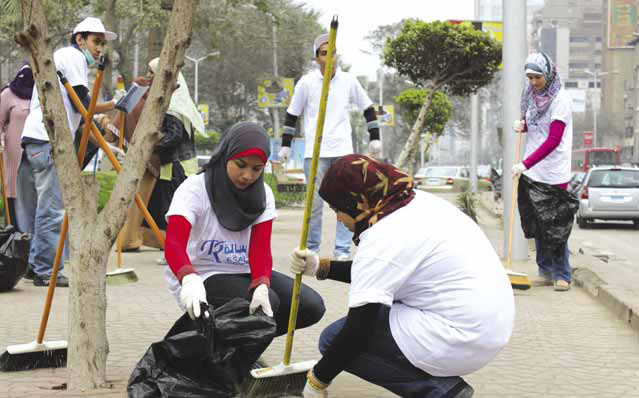
Members of Resala engage in post-revolution street clean-ups
 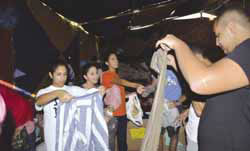 |
Ramadan activities
organized by Resala |
This will take time, but is better for all of us in the long run." Drawing prospects for a better future for the country, these NGOs are now thinking bigger and with less constraints than in the past. As explained by Ehaab Abdou '97, a member of the Federation of Egyptian Youth NGOs and co-founder of Fat'het Kheir and Nahdet El Mahrousa NGOs, the civil society sphere in Egypt is broadening. "There is definitely more space for civil society now, and we hope it is not temporary," said Abdou. "NGOs have started to speak more freely and engage in areas that were previously seen as taboo such as raising political awareness and holding debates about the constitution or policy change.
There are also many more informal initiatives such as neighborhood groups that are being set up everyday throughout the country, so it's a very positive start." On a related note, Barbara Ibrahim, director of AUC's John D. Gerhart Center for Philanthropy and Civic Engagement, said, "While civil society is no longer as restrained by an authoritarian regime, the energy and unleashing of innovative ideas will need to be met with capacity building for effective action. We see a large role for 'citizen business leaders' from the private sector to offer management and other organizing skills that civic groups will need to achieve their goals.
Egyptian universities also hold great potential to instill citizenship values and good practice in their students. All of this will be happening in a new atmosphere of empowerment. Youth coalitions, unions and professional syndicates are pushing back to change the rules of the game. They are more vocal –– demanding rather than complaining."
The Gerhart Center will concentrate its
upcoming work in Egypt on programs to engage
youth beyond the large metropolitan centers,
encouraging more transparent forms of
philanthropic giving and organizing peer-learning
opportunities among Egyptian university faculty and
students. The community foundation model will be
promoted to help informal neighborhood groups
grow. "Many of these groups are small yet agile," said
Karim Shalaby, the center's philanthropy adviser.
"They do not have big goals of changing remote
areas; they just want to serve their communities. We
need to offer creative models to help them develop." According to Abdou, civil society is not only
building a positive atmosphere in Egypt after the
revolution, it played a major role in bringing about change. "I always say that it was Egypt's
civil society work that helped prepare
and lead to the revolution," Abdou
said. "For years, civil society
organizations have been giving youth
the opportunity to express themselves;
gain confidence and leadership skills; as
well as appreciate the meaning of civic
engagement, the value of serving one's
country and the ability to dream. So
when the time was right, all those
efforts converged in Tahrir, and civil
society contributed to sustaining the
momentum."
Resala has 49 branches nationwide with more than 100,000 volunteers | 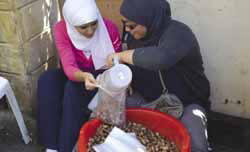 | 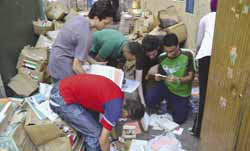 |
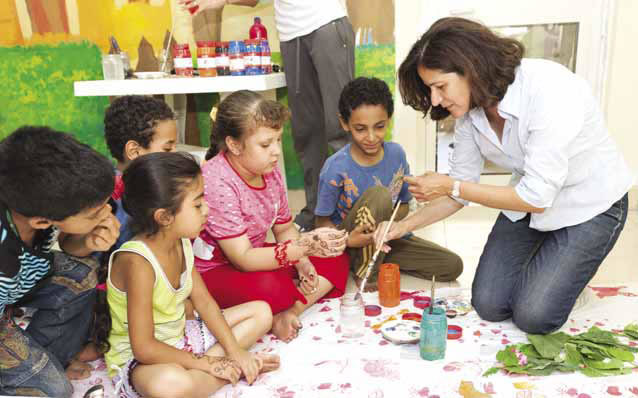
Alwan wa Awtar NGO, founded by Kamel, helps the underprivileged express themselves through art
Moving forward, civil society organizations are longing for more freedom and, as Abdel Azeem put it, "for an end to the harassment of NGOs concerned with securing human rights and consumer
protection." In contrast to the
governmental micro-management of
the structure of NGOs, deciding on
everything from the size of the board
to the timing of elections, he looks
forward to Resala being able to
determine the size and maintenance of
its own organizational structure, and to
build upon what it has learned as an
organization to serve the specific needs
of the transitional period. "Resala's role
is positive in the current circumstances
just by being a source of spreading
activism, volunteerism and giving," he
said."We know now that we own the
country, and this is creating an
impulsive spirit of giving that was not
there before. Egypt needs this spirit
more than anything."
Ayman Ismail '95, '97, a board
member of Nahdet El Mahrousa
NGO, which incubates youth social
entrepreneurs and their projects, also
highlighted the heightened sense of
volunteerism. "The level of excitement
is unprecedented," he said. "People
wanted to feel ownership of their
society, but had no faith in the system.
Now there is huge interest, and people
want to donate their time and money,
and contribute to the social and
political excitement."
On the other hand, this new interest
in civil society and activist communities
may actually cause a potentially
destabilizing period of transition.
"Many of our newest volunteers want
to get into civil society, but never had
experience," explained Loay El
Shawarby '94. "There is a learning
curve, and it will take time before they
become effective. These new activists
are also streaming in at a time when
many of the leaders of different
organizations and businessmen who
have historically donated are moving
into politics, also creating a void."
To face this challenging period of
transition, Nahdet El Mahrousa has
continued to strengthen existing
programs, while adding several new
initiatives that support the positive
culture of the revolution. "We have
just introduced five new social
enterprises in arts, culture and political
awareness, including a salon series that
focuses on contemporary political,
economic and social issues to support
a spirit of discussion and positive
discourse," said Ismail.
In addition to enhancing and adding
programs to their line of work, civil
society organizations need to have a
unified and strong voice. "One of the
main criticisms of Egypt's civil society
is that it is highly fragmented," Abdou
said. "There has to be more
coordination and consensus-building
among NGOs so that they
complement and not compete with
each other. … Egypt's civil society
played a key leadership role in
bringing about the revolution and,
hence, needs to be included and
brought to the table. If we are serious
about having civil society
organizations as equal partners in
Egypt's development and progress,
then we need to help build their
capacity and review restrictive laws
and regulations such as the NGO law
(84-2002), awqaf [endowment] law
and others."
Echoing the same sentiment, Kamel
noted, "Previously, civil society was
seen as an enemy to the state, but
with the proper government in place,
we will work hand in hand with both
the government and private sector. We
have access to the masses, and with
the right approach, will be able to
address their needs and formulate
agendas based on that. We have to stop
living in a bubble and be able to reach
people at the grass-roots level. Only
then will we see positive change in
the country."
